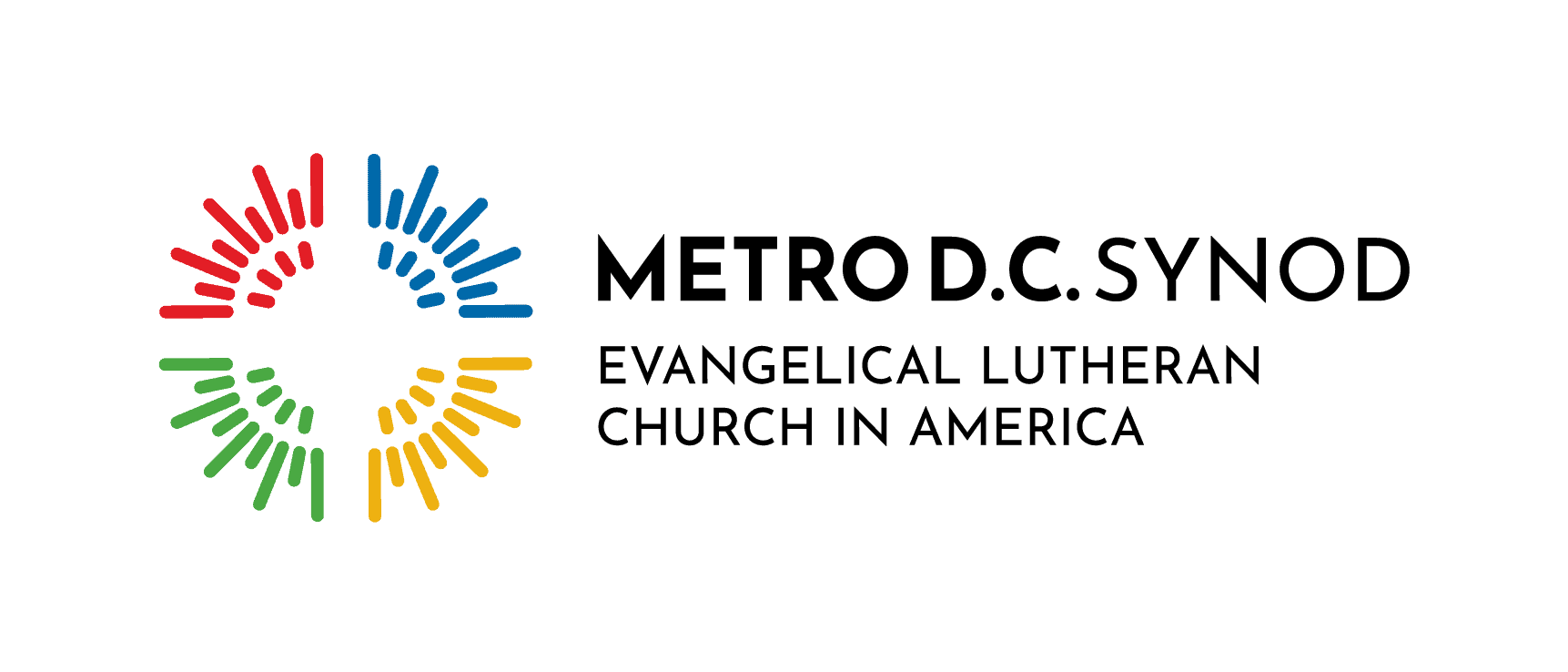From the Bishop’s Desk: Is there a pattern?

“’When they saw him, they worshipped him; but some doubted.’ …I love this verse first of all for its honesty. It rings true… And I love this verse, too, because I think it applies to us.” With unshielded eyes, the Rev. Richard Graham offers his observations on synod life in his 2012 Report of the Bishop to the Metro D.C. Synod Assembly. This report follows, also available in downloadable pdf.
Dear friends,
There is a small verse of scripture that has brought me great comfort lately. It’s buried among the Easter stories, in Matthew’s Gospel. According to Matthew’s telling, the followers of Jesus return to Galilee, their home country, after the resurrection. There Jesus comes to be with them, to teach them and to bless them. And it says (this is Matthew 28:17), “When they saw him, they worshipped him; but some doubted.” They worshipped him, but some doubted.
I love this verse first of all for its honesty. It rings true. Of course, some of the disciples doubted. They knew that Jesus had been executed and buried. They still had their questions, even with him standing in front of them. And yet he trusts them. He sends them out with his full authority to make disciples everywhere in the world. He promises to be with them, “to the end of the age.”
And I love this verse, too, because I think it applies to us. We worship our Lord Jesus because we love him, because we know that we belong to him. Through the course of our lives we have felt his power and his presence. And we know other people who have followed him and who have set us examples of decency and compassion. We want to be like them. We want to be like Jesus.
Place of Doubt
Yet we have our doubts. Increasingly, I think we wonder if worshipping Jesus and following him is making any difference. We find ourselves surrounded by people who don’t share our faith (some of whom don’t seem to have a religious faith at all) but whose lives go on very nicely. In this prosperous, powerful part of the world, Christian faith always gets a certain honorable lip-service. But is anybody’s life actually marked by faith in Jesus?
And does it make any difference if we do anything together? Busy as we all are, hard as everybody works, given so many opportunities to amuse ourselves and educate ourselves, what does it mean to be part of anything much larger than out family? Do we need a local community to support our faith? Do we need something like a synod?
If I believed I was the only one thinking these thoughts, I would keep them to myself. But I know that people everywhere are asking themselves how our faith matters. And they are asking themselves if, really, they need anyone else. Abstract answers to these concerns don’t carry much conviction any more. But concrete answers, based on what we can actually see, do matter.
Concrete Occurrences
Let me try these:
- I worshipped and preached yesterday at St. John Lutheran Church in Riverdale, Maryland. It was the congregation’s 90th anniversary celebration. There have been struggles here through the years, and questions about whether the congregation should close. But there were ten children for the children’s sermon, and three young people from an African Lutheran family assisting in worship. The meal after worship was catered and served by students from the University of Maryland Campus Ministry, who donated what they earned to the ELCA Malaria Campaign.
- The property of Bethany Lutheran Church in Forestville, Maryland, was donated to the synod when the congregation closed. After several months, the property has been sold. The congregation’s decisions, and the Synod Council’s, mean that there will be money for the ELCA to use for new missions around the country. The synod will eventually use close to $600,000 for ministry in Prince George’s County. Another $300,000 was deposited in a Virginia bank to help secure a mortgage for Shepherd of the Hills Lutheran Church in Haymarket, Virginia.
- People at Christus Victor Lutheran Church in Manassas, Virginia, decided to open a new chapter in their history. They placed their congregation under the care and administration of the Synod Council. The council called Pastor Connie Thomson to move the ministry in new directions, with funding providing partly through an ELCA grant. The congregation renamed itself River of Grace Lutheran Church to mark its new beginning.
- At a meeting last week of pastors who have come to the synod in the last year, two of the new pastors were Ethiopian immigrants who were raised up for rostered ministry through our synod’s Candidacy Committee. The two serve as associate pastors in large suburban congregations where the membership is overwhelmingly European American.
- Mara Schleicher and some others in our synod challenged us to fill a shipping container with goods for the children’s hostels in Namibia. Everywhere I went last fall, congregations were receiving gifts of money for the project, and hats and books and soccer balls. (In two congregations where I visited there were contests after worship to see who could deflate a soccer ball quickest – they were trying to save space in the container.) Local contacts with the Namibian embassy led to the elimination of import duties on the goods.
- A group of us from the synod went to El Salvador last summer to help celebrate the 25th anniversary of the independent Lutheran church there. There were armed guards everywhere, and signs of a church faithful in the midst of great adversity. When our group returned, it made plans to ask the synod to support better salaries for Salvadoran pastors. Local Salvadoran members of synod congregations are part of the team for planning future actions.
- Driving off to preach one Sunday morning, I heard on the radio that people evicted from the “Occupy DC” camp in MacPherson Square had been welcomed into temporary shelter at Luther Place Memorial Church. By way of my Emergency Fund, the synod provided money the protesters needed to do their laundry.
A Pattern?

The Christian witness in our synod is alive and vibrant today. I see signs of that vibrancy in many places as I travel. I see signs of life of where death would certainly seem to have the upper hand. Some of the signs of life are small. Most of them spring out of difficult decisions, and controversy. But in places where something has been allowed to change and to die, something new is coming to life.
Many of the signs of life I see call into question the institutional forms of our common life. How much change can we tolerate? How should we organize ourselves if we want to be quick and responsive with our help for one another? How can we let each other know if one of us has a really good idea? Who is responsible for saying “no” when that is necessary? What kind of authority will we give each other in our synod? Who will pay for all of this, and how?
But the Lord Jesus is moving among us. In the midst of some controversies we can’t seem to shake, struggling to recover from a great recession, we know that we are people whose witness matters. And increasingly we seem to recognize that we are counter-cultural people. Our Christian faith makes us question the materialism around us, the “it’s all about me” around us. We raise our voices for the poor and the young. We encourage questions. We sacrifice for the common good. We say that Jesus Christ is the light of the world.
Bravery
I want us all to be braver about sharing our faith. My prayer is for each one of us, every member of every congregation and ministry, to be able to say why Jesus matters in our lives. I want us to talk about what Jesus is asking us to be, so that with our neighbors and co-workers and friends we can give a reason for the hope that sustains us. In a world where hope is in such short supply, I long for us to be faithfully hopeful.
I know this is hard. I know that some of us associate talking about Jesus with coercion and condescension toward others. I know that some of us don’t really like to talk to others about our faith unless we’re sure ahead of time they’ll agree with us. I know that some of us remember when churches could grow and prosper without much talking about faith at all.
And I know that some things that we have done together have faded from the life of our synod. I know that we are united to each other by networks of common concern more and more, united to each other by formal structures less and less. Everything is different.
But our Lord Jesus promised to be with his disciples forever, and he promised that the gates of hell would not prevail against his Church. If the gates of hell cannot prevail against the Church, the shifts and twists of American culture surely will not harm it. And we are blessed to be about the Lord’s business together. There is an excitement and an enthusiasm in our synod that makes me proud. We seem to know that among all the changes and chances of our present life, Jesus is calling us into something deeper and richer. I am not sure what our future will be. I know we will be blessed as the future is revealed.
Gratitude
So thank you for the opportunity to be your bishop and to share your lives of struggle and faith. In the other members of the synod staff I have the very best people in the world to work with. My family supports me and graciously makes room for all the commitments of a bishop’s life. I know you hold me in your prayers.
And I pray for you, too. I pray that in the midst of our doubts, our questions and our confusion, we may know together what will make for the glory of God and the good of our neighbors. I pray that we will become more and more what Jesus will have us to be, so that now and forever we can live in his presence.
In His name,
The Rev. Richard H. Graham
Bishop
Metropolitan Washington, D.C. Synod
Evangelical Lutheran Church in America


